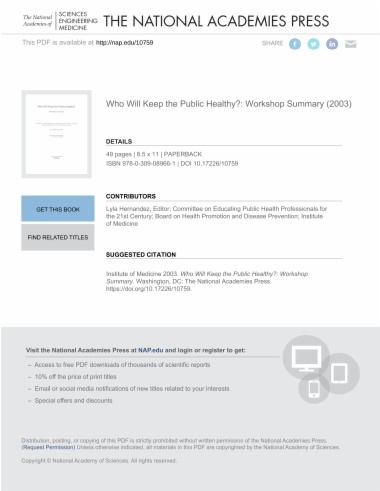

In today's world the public faces many health threats from bioterrorism to the epidemic of obesity. It's thus important to have an effective public health system. This system depends significantly on the quality and preparedness of our public health workforce as well as the quality of public health education and training. In March, 2001 the Robert Wood Johnson Foundation asked the Institute of Medicine (IOM) to examine the education of public health professionals and develop recommendations for how public health education, training, and research could be strengthened to meet the needs of future public health professionals to improve population-level health. As a result the Committee on Educating Public Health Professionals for the 21st Century was formed; members can be seen in Appendix A.
Over the course of one year, the committee held five meetings; reviewed and analyzed key literature; and abstracted, analyzed, and synthesized data from catalogs, web sites, and survey responses of accredited schools of public health. Because numerous institutions and agencies play important roles in public health education, training, research, and leadership development, the report addresses its recommendations to schools of public health, degree-granting programs in public health, medical schools, schools of nursing, other professional schools (e.g., law), and local, state, and federal public health agencies. Conclusions and recommendations for each of these sectors are present in the report.
The report generated a lot of discussion, resulting in the Robert Wood Johnson Foundation asking the IOM to hold a workshop of interested people to foster joint discussion among the academic and practice communities. The workshop was held May 22, 2003 and over 100 representatives attended. Who Will Keep the Public Healthy?: Workshop Summary includes the workshop presentations, recommendations, workshop agendas, and more.